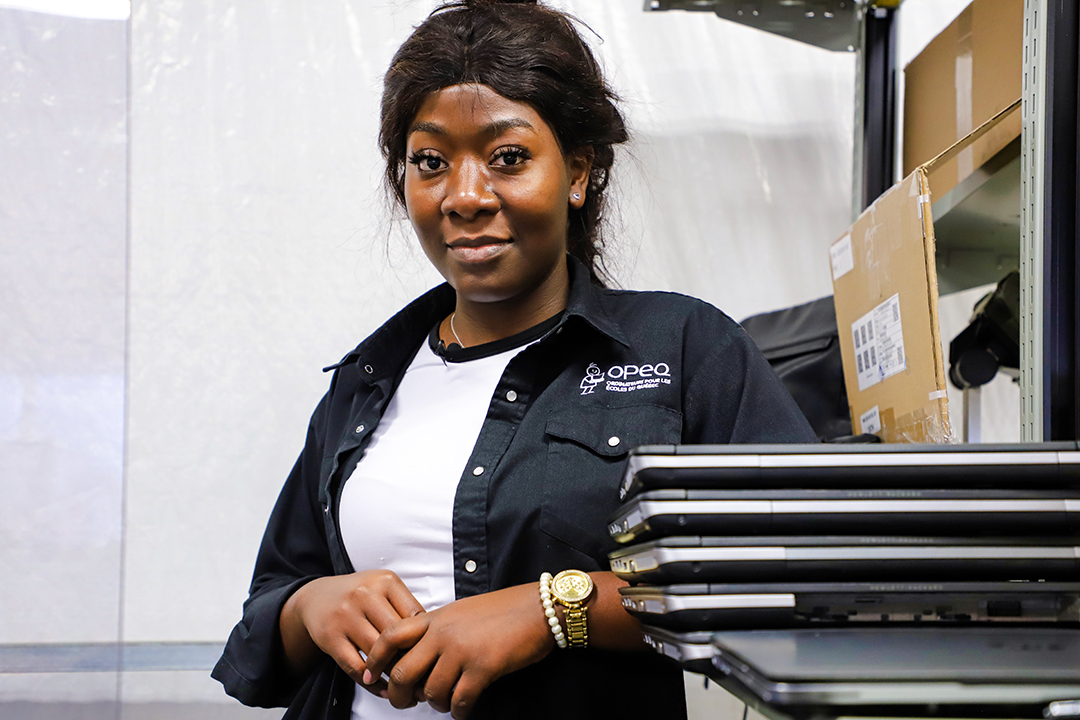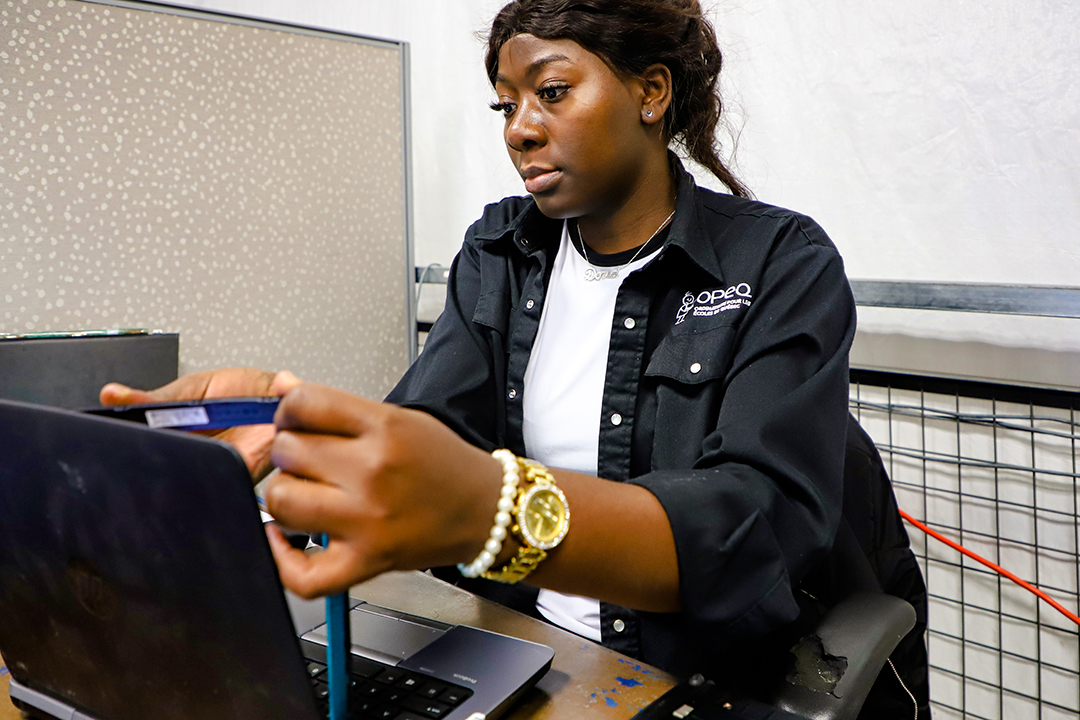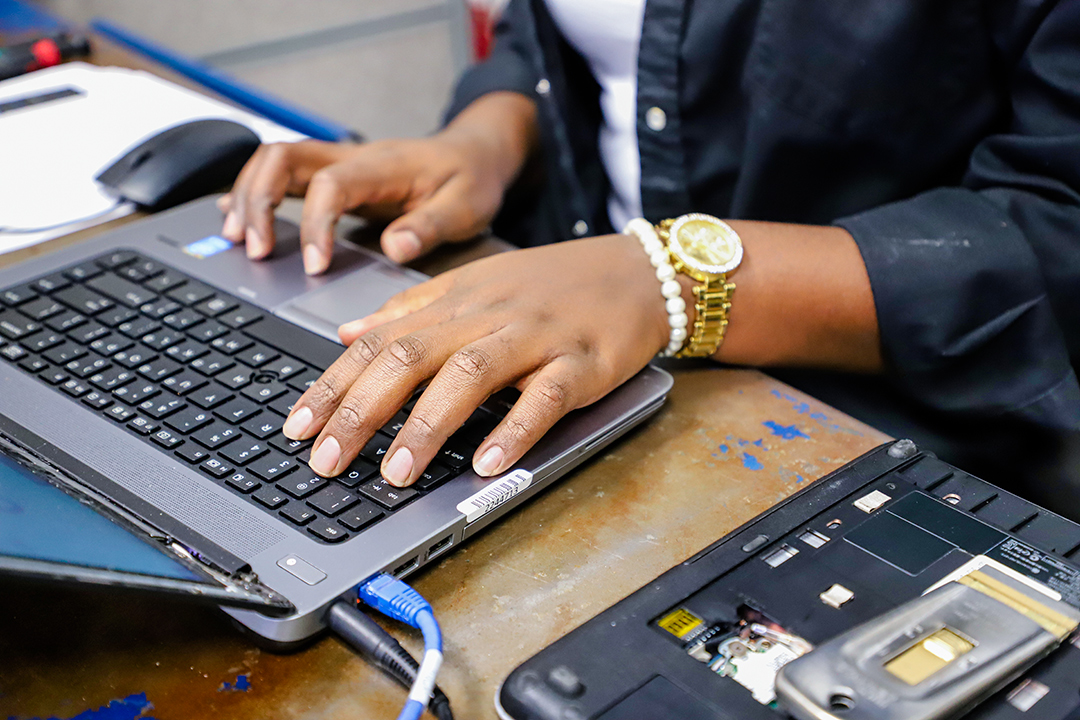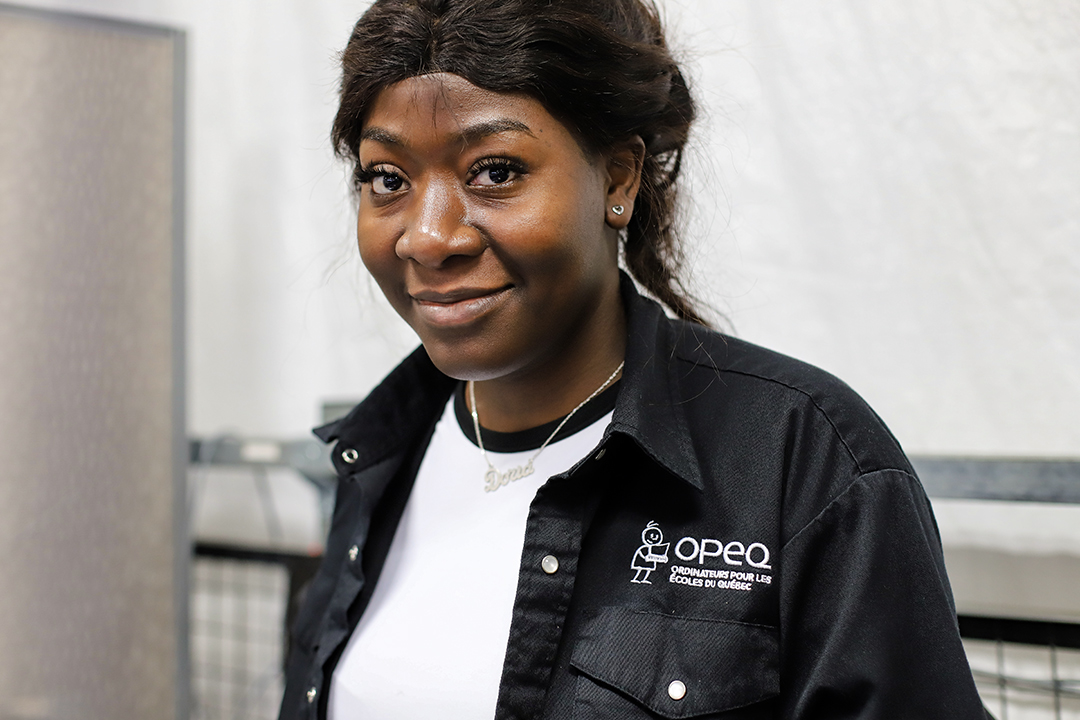Before she considered moving across the Atlantic to pursue her academic career, Doria began a bachelor’s degree in Microbiology back in Cameroon but realized that her lack of computer skills was hindering her success. She therefore decided to take a break from university to hone her knowledge of office automation. “As is often the case in Cameroon when it comes to technical courses, there was a severe lack of infrastructure equipment. The training was almost abstract, only theoretical, so I thought it preferable to give it up,” she says.
Doria’s uncle, who immigrated to Québec, frequently spoke about the quality of the computer-related trainings here. Slowly, an idea took root in the young woman’s mind. “He told me about the quality of Québec’s infrastructure and the possibility of improving my skills. I’ve always had a passion for computers, but we had the bare minimum back home. He convinced me that computing support was a field with a great future.”
Administrative Procedures
 With the support of her family, Doria chose Québec. She is full of aspirations, and a DVS in Computing Support is in her near future.
With the support of her family, Doria chose Québec. She is full of aspirations, and a DVS in Computing Support is in her near future.The process of coming to study in Québec as an international student requires patience. Doria first enrolled in Computing Support at the Centre de formation professionnelle Marie-Rollet, a vocational school her uncle chose based on its good reputation.
After being accepted by the educational institution, Doria sent in her request to the Ministère de l’Immigration, de la Diversité et de l’Inclusion (MIDI) for a Québec Acceptance Certificate (CAQ) for studies. “I had to re-apply three times because the visa was not being issued,” she recalls. “The fourth time finally went through.”
Studying in Québec
 Like thousands of international students each year, Doria went through the various stages of immigration to obtain her study permit, allowing her to finance her training while working in a CHSLD.
Like thousands of international students each year, Doria went through the various stages of immigration to obtain her study permit, allowing her to finance her training while working in a CHSLD.Approval for the Québec Acceptance Certificate (CAQ) is contingent on certain criteria, including financial capacity. Applicants must provide proof that they possess the necessary funds to cover tuition, living expenses for the duration of their stay and travel fees (round trip from their country). “The amount required, $27,000, represents a fortune for my father,” says Doria. “This is a huge sacrifice for my family, and I cannot afford to fail.” After the required medical exams, everything fell into place for the young woman to begin her training program in the fall of 2019. Two organizations supported her throughout her journey: Québec International and Québec Métiers d’Avenir.
A Whole New World
 At the Centre de formation professionnelle Marie-Rollet, individualized training was significant to her success.
At the Centre de formation professionnelle Marie-Rollet, individualized training was significant to her success.When the time came to pack her bags, Doria knew she would be leaving her family behind for at least 18 months. “It was a bit brutal. Even though it was for a good cause, the goodbyes were very tough for my parents and me, especially since I was the first in the family to leave the house, and it was my first experience outside of my native country.” Doria admits that she went through a dark time after arriving in Québec in July 2019. “I had never lived away from my parents, and I was very surprised, shocked even, to see how people here live differently. Everyone is doing their own thing, and it’s every man for himself. I was homesick.”
Fortunately for Doria, she is not alone and lives with her uncle and his wife and children. “Through the contact I had with their kids, I was able to familiarize myself with the French spoken here. At first, I could not understand a thing when it came to things like expressions and swear words,” she confides. “It really helped me immerse myself in the local culture.”
Her aunt helped her find her bearings in the city. “We went to buy clothes, and we visited the school. She even did the bus commute to the vocational centre with me and helped me with the final administrative details. She is also studying in Québec, so we shared this reality, and she encouraged me a lot.”
After receiving her CAQ, Doria applied for a study permit from the Canadian government. This permit allows students to work in Québec a maximum of 20 hours per week during regular terms, and full-time during school breaks. In fact, before the pandemic hit and disrupted everything, Doria was working at a small food counter in a CHLSD.
A Non-Traditional Industry
 Individualized training goes at your own pace. Your weaknesses are your own. When you move on to the next step, it’s because you have mastered the learning. School taught me something very important: everyone starts from scratch,” says Doria.
Individualized training goes at your own pace. Your weaknesses are your own. When you move on to the next step, it’s because you have mastered the learning. School taught me something very important: everyone starts from scratch,” says Doria.At the Centre de formation professionnelle Marie-Rollet, Doria is learning about technical troubleshooting, software installation and networking. This training also helps students get comfortable with customer service (answering user questions, resolving various IT problems, and assembling computers).
In Cameroon, like in Québec, the computing sector has always been a sector where women are few and far between. In her class in Québec City, Doria has only one female classmate. “The first thing I heard when we visited the classrooms was ‘Wow, girls!’” she recalls with a laugh. “Someone was surprised to see us, and it gave me the impression that it would be very difficult. Luckily, the teachers were amazing and took the time to make sure I was comfortable and really understood the language here.”
At the vocational centre, amongst the factors that contributed to her success, Doria mentions individualized training. “This type of training goes at your own pace. Your weaknesses are your own. When you move on to the next step, it’s because you have mastered the learning. School taught me something very important: everyone starts from scratch.” The young woman has never regretted her choice to study in Québec. “I could not have dreamed of something better. At first, I was scared: scared I would not live up to expectations and scared that I would not be able to solve problems. But as I went along in my training, I gained confidence and got over my insecurities.”
Doria recounts one of her funnier moments: “I managed to assemble a computer by myself. After almost setting the class on fire – there were a few sparks that frightened my teacher! – I sent a video to my friends and family in Cameroon. They couldn’t believe their eyes!"
"Individualized training goes at your own pace. Your weaknesses are your own. When you move on to the next step, it’s because you have mastered the learning. School taught me something very important: everyone starts from scratch."
A Future... in Québec?
 After graduating, Doria hopes to work in Québec, maybe even further her studies by attending university for Computer Engineering. “Fortune favours the bold!”
After graduating, Doria hopes to work in Québec, maybe even further her studies by attending university for Computer Engineering. “Fortune favours the bold!”The difference between education in Cameroon versus education in Québec? “There is a world of difference,” she says. “Students are like customers here. In Cameroon, teachers do not really care about our success.” The Covid 19 pandemic and the lockdown in spring 2020 forced the young woman to stop her studies momentarily. Since then, classes have resumed, and she will need to extend her permit to finish her DVS. “Once I graduate, I will try to find work so that I can stay in Québec and get residency status.” She is considering pushing her academic journey even further, maybe even going to university to study Computer Engineering. “I do not want to set limits for myself; I want to excel. As we say in my family, fortune favors the bold!”
"I received a VERY traditional education in Cameroon, but my parents believed in me and the power of education. I could not dream of a better education than what I have received here in Québec."
